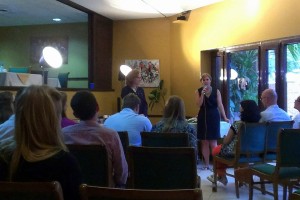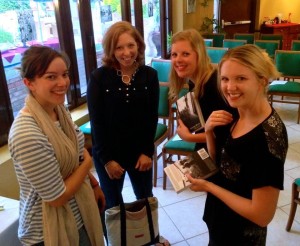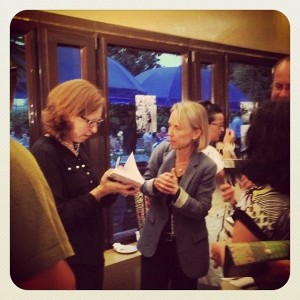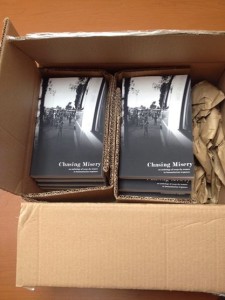We were very grateful to the U.S. Embassy for hosting our first book event in Pakistan! The Head of the Editorial Team, Kelsey Hoppe, was on hand to introduce the book, read an essay and sign some copies.
Blog
http://peacecorpsworldwide.org/pc-writers/2014/04/23/chasing-misery/
Chasing Misery: An Anthology of Essays by Women in Humanitarian Responses
 Chasing Misery: An Anthology of Essays by Women in Humanitarian Responses
Chasing Misery: An Anthology of Essays by Women in Humanitarian Responses
Edited by Kelsey Hoppe
Includes essays by Miranda Bryant (Kazakhstan 2000–02), Caryl Feldacker (Ecuador 1999–01), Emilie Greenhalgh (Cameroon 2007–09), Carmen Sheehan (Ecuador 2000–03); and photographs by Jenn Warren (Jordan 2002)
CreateSpace
$10.25 (paperback), $6.99 (Kindle)
318 pages
2014
Reviewed by Susi Wyss (Central African Republic 1990-92)
All of the two dozen essays in Chasing Misery are written by women-including four recent RPCVs-who are attempting to describe their experiences working on humanitarian responses of the last decade around the world. While these crises each have their own causes and particular issues, and the people who work on them each have their own motivations and experiences, the world of humanitarian aid and the people dispensing it share enough in common to make this collection a cohesive whole.
As any RPCV who has tried to write about their own experience knows, what the authors in this collection have set out to do is no easy task. How does one capture in a short essay the countless challenges, frustrations, disappointments, the emotional highs and lows? In Chasing Misery, the authors focus on different aspects of their relief work experience, including their fear in the face of danger (Kelsey Hoppe’s “I Know What Fear Tastes Like”), the emotional numbness developed by so many aid workers (Alison Hayes’ “Personal Earthquakes”), the climate of uncertainty and volatility (Erin Patrick’s “The Coup”), the daily discomforts (Helen Seeger’s “The Field: The Ever Receding Vanishing Point”), and the difficulty of maintaining an intimate relationship while carrying out relief work (Caryl Feldacker’s “Home Is Where the Hard Is”). While Tracy O’Heir’s essay, “Beating the Odds,” focuses on a woman she helped through her work, Mia Ali’s essay, “Built to Carry Thirteen,” shines the spotlight on someone whose life couldn’t be saved. This varied emphasis gives the book an appealing, something-for-everyone diversity.
As with just about any anthology, some essays in Chasing Misery are more compelling than others. The best ones are those that capture emotions and larger truths through the telling of a story, rather than through summary and description. For example, RPCV Carmen Sheehan’s essay, “No Place,” may initially seem like a re-telling of 24 hours in Darfur, during which her counterpart is detained by the police and Sheehan encounters a nighttime checkpoint manned by teenagers with AK-47s-while driving alone after curfew. But even as she holds the reader hostage to her story, Sheehan grapples with larger truths:
[W]hat makes some people so different from others? How can one man breathe brutality, while the next-of the same religion and tongue-follow to comfort the dying? And what of the survivors? Why him? Why her? Why us?
Darfur and South Sudan are the most prominently featured countries in Chasing Misery-each has four essays. And the collection includes many other countries you’d expect to see in an anthology like this-such as Haiti, Uganda, and DRC. But there are some unexpected settings, too, like post-tsunami Japan and post-Katrina New Orleans. For those who aren’t familiar with the ins and outs of each crisis, the book includes brief explanations of the country context prior to the relevant essays. There are photographs, as well, complementing the text with a welcome visual. RPCV Jenn Warren’s pictures of Katrina, South Sudan, Rwanda, and Burundi, as well as of Tibetan refugees in India, are especially noteworthy.
For the most part, the essays in Chasing Misery feel honest and unvarnished. They don’t seek to glorify the work of humanitarian aid workers or explain what draws some people to this line of work. Nor does the book try to answer the question of how future crises could be prevented. Instead, as Editor Kelsey Hoppe explains in her preface, the book’s goal is to show “sliver[s] of human existence full of suffering and misery, and also joy, and laughter and amazing people.” The result is a book that many RPCVs will be able to relate to-beyond the descriptions of bucket baths and local beer. Maybe Malka Older’s words will resonate best of all, when she writes (in her essay, “Accepting Thanks”):
“I am fairly sure that, as usual, I got more out if than I gave.”
What RPCV hasn’t summarized his or her Peace Corps experience with similar words?
Susi Wyss is the author of The Civilized World, a novel in stories set across Africa that received the 2011 Maria Thomas Fiction Award from Peace Corps Writers and was named a “Book to Pick Up Now” by O, the Oprah Magazine. You can find her online at: www.susiwyss.com.
Development Works is a research, evaluation and communications consultancy working on development issues. Their take on Chasing Misery…
Through the essays and photos, different women reflect on their time and experiences in Congo, Nigeria, Pakistan, Indonesia, Malawi and other troubled areas of the world. The essays are incredibly personal and, at times, difficult to read. Police beating protesting refugees in the street, children describing the cannibalism of a rebel group, guilt experienced after hiring a colleague who was executed, being able to accept thanks for simply doing your job.
Chasing Misery’s photo editor and one of the book’s photographers, CC&DW Communications Manager Jenn Warren, shares her insight to the world of humanitarian work from a visual perspective, “It’s not easy to reconcile what you see in a disaster, who you meet and the often traumatizing experiences you document, with life back at home – or with life back on the secure NGO compound. People open up, share their pain and their joy, and it is easy to feel like you are taking what little they have and leaving them behind. You question what good it is doing, and how the work is helping. As a contributor, Chasing Misery has brought us together to share these often unsaid, shared, feelings with one another and with those interested in this work.”
To read the entire blog post click here.






